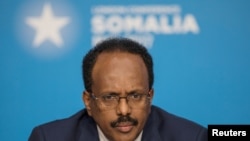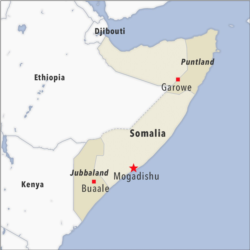Somalia’s parliament on Saturday ruled out a possible term extension for incumbent President Mohamed Abdullahi Farmajo.
Parliament Speaker Mohamed Mursal Sheikh said there was no plan by the national assembly to extend Farmajo's term beyond its Monday expiration date.
Mursal spoke after talks that included the president, Prime Minister Mohamed Hussein Roble and the regional leaders of the five Somali states failed Friday to agree on a procedure for selecting a new president.
Mursal said the role of parliament, for now, was seeking de-escalation of the political crisis, not a term extension.
Speaking to parliament, Farmajo said his administration would embark on the implementation of the September 17, 2020, electoral agreement, which would allow 101 delegates to select members of parliament, who would choose the next head of the state.
Two regional states, however, have refused to take part in the process. Jubbaland and Puntland have objected to issues including how electoral management bodies should be appointed and delegates selected. That includes delegates from the breakaway region of Somaliland, which considers itself an independent country though it is not internationally recognized.
Farmajo said his administration was ready to apply the electoral agreement and he requested that the parliament spearhead efforts to reach out to other political stakeholders in the country, including the state leaders who rejected the agreement, for a solution.
More calls for dialogue
Opposition presidential candidates, led by former head of state Sheikh Sharif Ahmed, reiterated calls for dialogue to resolve issues surrounding the selection process.
Ahmed said the opposition political parties were ready to take part in negotiations to avoid action that might harm peace and stability in the Horn of Africa nation.
The international community, led by the U.N. office in the country, is also trying to bring the sides together to avert security setbacks.
Somalia has had peaceful changes of leadership every four years since 2000, and it has the distinction of having Africa’s first democratically elected president to peacefully step down, Aden Abdulle Osman, in 1967.
But the goal of a direct, one-person-one-vote election in Somalia remains elusive. It was meant to take place this time. Instead, the federal government and states agreed on another “indirect election,” with senators and members of parliament elected by community leaders — delegates of powerful clans — in each member state.
Members of parliament and senators then elect Somalia’s president.
Opposition leaders and civil society groups have objected, arguing it leaves them no say in the politics of their own country.
The Associated Press contributed to this report.





